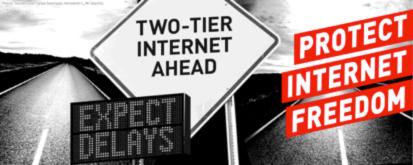By Peter Cruice
On December 14, 2017, a vote will decide whether net neutrality will come to a halt, and thus supply internet service providers the tools to restrict the internet for its customers. Net neutrality is the freedom of the user to visit websites without internet service providers restricting the access to freely roam the internet. By ending net neutrality, the internet service providers will be able to block users from visiting websites, throttle the speed of their internet access, and charge a premium to visit certain online sites.
Proponents of ending net neutrality believe that wiping out the rules for users will give internet service providers more control over the internet content and the ability to charge a tax for premium internet content, which will in turn incentivize investment. Getting rid of net neutrality would have serious ramifications. The internet service providers would be able to throttle the speeds of the internet so high-paying websites would be visited more frequently. The non-paying websites would be left with little to no visitors because of how long it would take to load each page of the website. The internet service provider would be able to freely block certain types of news content and thus influence the political spectrum in any way they wish.
If net neutrality was killed off, online video streaming would become a disaster. Companies like Netflix, Hulu, HBO, and other online media websites would have to pay the internet service providers a premium in order to not have the speeds of their content throttled to their paying subscription customers. Video gamers would also run into a whole mess of issues. It would become a bidding war for online game companies to shell out the highest premium in order for their games to have the highest speeds, which would raise the cost of the price for the video game and its online function.
Internet service providers will significantly profit, not only from being paid premiums from other websites, but also from the customers. The internet service providers will not lower the already expensive cost of high speed internet, but could potentially charge an even higher monthly fee. Who is to profit? The internet service providers. Who in the FCC is leading the charge to kill net neutrality? Chairman Ajit Pai. Pai was formerly general counsel of Verizon Communications, and some believe he is trying to give a gift back to these monopolized corporations, Verizon being one of them.
There have been major efforts to stop the FCC from killing net neutrality. It has been estimated that more than 22 million people have filed comments with the agency. However, their needs to be more public awareness and political action taken against the FCC in order to keep the internet free from restrictions and corporate greed. People can reach out to the FCC or Congressman to voice their concern but must act quickly before December 14, 2017.
Student Bio: Peter Cruice is a 3L at Suffolk University Law School. He is currently a staff member of The Journal of High Technology. Peter holds a B.A. from Hobart College.
Disclaimer: The views expressed in this blog are the views of the author alone and do not represent the views of JHTL or Suffolk University Law School.

